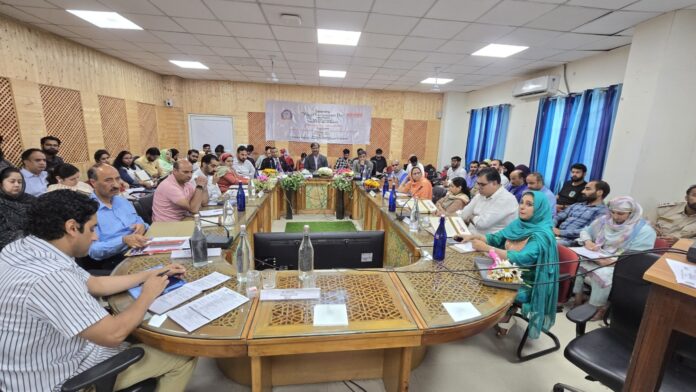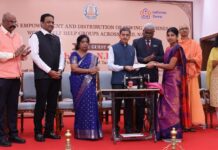On World Environment Day, the School of Life Sciences, Central University of Kashmir and ActionAid Association organised a discussion on “Land Degradation, Desertification, and Drought Resilience.” The programme was part of the “Uniting to Save Our Planet Earth” campaign and was held at the university campus in Tulmulla, Ganderbal, Jammu, and Kashmir.
In his presidential address to the participants, Vice-Chancellor of Central University of Kashmir, Prof. A. Ravinder Nath, underscored the need to address the environmental challenges posed by land degradation, desertification, and greenhouse gas emissions. “By committing to sustainable practices and policies, we can create a healthier, more resilient environment for ourselves and future generations,” Ravinder Nath said.
He said that unsustainable agricultural practices, deforestation, and urbanisation lead to soil erosion, the loss of fertile land, and a decline in ecosystem health. “Immediate action is essential to restore degraded lands, promote sustainable land management, and protect our natural resources,” he said.
Sandeep Chachra, Executive Director, ActionAid Association, spoke about the Himalayan diversity, different domains of ecology, glacial recessions, and the fragility of ecosystems. He discussed the impact of climate change on the human population. He called for cooperation among different stakeholders, and as has happened with this meeting, between civil society organisations and academic institutions, to educate people about the adverse effects of growing environmental pollution and subsequent climate change.
Dr. B. Madhusudan Reddy, a noted environmentalist and columnist,raised the issue ofhow environmental degradation led to massive floods in rural and urban areas. He discussed the very basis of climate change, the restoration of wetlands, and the future needs.He also highlighted the indiscriminate use of pesticides and fertilisers, which directly impact the environment and human health.
Prof. Abid Hamid, Dean, School of Life Sciences and Head, Department of Biotechnology, called for the restoration of wetlands, reducing pollution, and minimising the use of plastics. He said the consequences of desertification are devastating: reduced agricultural productivity, increased poverty, and forced migration.
“By implementing strategies such as reforestation, soil conservation, and water management, we can combat desertification and build resilient communities,” Prof Hamidadded.
Prof. Azra N. Kamili, co-convenor of the event, highlighted the role of the masses in addressing environmental issues and said coordinated efforts from all sections of society were needed to check the ever-increasing environmental degradation. She further informed the participants about different environmental policies adopted at the national and international levels.
Nadiya Habib, Project Lead, ActionAid Association, summarised the work of ActionAid Association across India, working on social and economic justice, empowering marginal groups, and promoting women’s rights.She further said that in Jammu and Kashmir, the ActionAid Association primarily focuses on community rights, livelihood rebuilding, and social security support.
Technical sessions were organised throughout the day, during which experts discussed the urgent need to address land degradation, desertification, and the adverse effects of greenhouse gases on the environment.
Other faculty members, research scholars, university students, and members of the ActionAid Association attended the programme.











